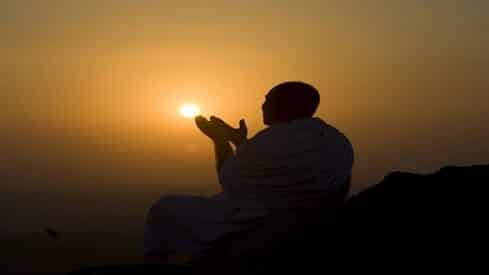Sheikh Mustafa Al-Zarqa, may Allah have mercy on him, said:
Hajj is one of the obligations of the religion and one of the principles of Islam. The foundation of performing these obligations is sincerity, so that they are accepted by Allah, pleasing to Him, and worthy of their immense reward. An accepted Hajj means a Hajj which Allah rewards with goodness, and Hajj is like that if no sin is mixed with it.
In order for the Hajj to be accepted, a person must complete his pilgrimage sincerely for the face of his Lord; because when Allah, the Most High, enjoined Hajj on the people, in His book, he indicated that this obligation is for him and nothing else. He said: {And [due] to Allah from the people is a pilgrimage to the House – for whoever is able to find thereto a way. But whoever disbelieves [i.e., refuses] – then indeed, Allah is free from need of the worlds.} [Al Imran:97]
Therefore, whoever wants an accepted Hajj must observe it with the intention of obedience to Allah the Almighty and getting closer to Him, not with the intention of another worldly matter or one of the desires of the soul. This is what the Messenger, peace be upon him, says: “No one goes out from his house except there are two banners in hand: one in the hand of an angel and one in the hand of Satan. Verily, if he goes out for a reason Allah loves, the angel will follow him with his banner and he will continue to be under the banner of the angel until he returns home. If he goes out for a reason displeasing to Allah, Satan will follow him with his banner and he will continue to be under the banner of Satan until he returns home.”
In order for the Hajj to be accepted, the pilgrim should turn to his Lord sincerely with supplication and hope, repentance and seeking forgiveness, and supplicates like: O Allah, you are the companion in travel, and the successor in the family, O Allah, I seek refuge in You from bad companionship in travel and sadness on return, O Allah, fold the Earth for us, and make it easy for us to travel.
There are many such supplications in various places and occasions, because a pure, honest and sincere supplication is the brain of worship, as it was reported from the Messenger of Allah, peace be upon him.
In order for the Hajj to be accepted, the one performing it must perform Hajj from good, lawful money, which is neither forbidden nor bad, because the Messenger, peace and blessings be upon him, says: “Allah is good and accepts only what is good.”
And He, peace and blessings of be upon him, says: “If the pilgrim goes out for Hajj with a good expense, and puts his foot in the stirrup and calls: Labbayk, O Allah, Labbayk, a caller from heaven calls to him: Labbayk wa Sa’dayk (i.e., God has answered your pilgrimage one answer after another), your provision is lawful, and your comfort (your means of travel)) is permissible, and your Hajj is accepted and not falsified. And if he comes out with impure wealth, and puts his foot in the stirrup, and calls out: Labbayk, a caller from heaven calls to him: neither Labbayk nor Sa’dayk, your provision is forbidden, your spending is forbidden, and your Hajj has no reward.”
Among the requirements of an accepted Hajj is that the pilgrim should not neglect any of its duties, nor its etiquette and Sunnah, and that there be a lot of obedience, worship and spending. He should be a good example of noble morals, feed food as much as he can, speaks gently, bears the mistakes of others and to forgive and pardon. He returns from Hajj ascetic from the desires of this world, rather desiring the good deeds of the Hereafter, and with the intention of perpetual repentance and righteousness. Allah the Almighty says: {Hajj is [during] well-known months, so whoever has made Hajj obligatory upon himself therein [by entering the state of iḥrām], there is [to be for him] no sexual relations and no disobedience and no disputing during Hajj. And whatever good you do – Allah knows it. And take provisions, but indeed, the best provision is fear of Allah. And fear Me, O you of understanding.}
Also, the prophet, peace be upon him said: “Whoever performs Hajj (pilgrimage) and does not have sexual relations (with his wife), nor commits sin, nor disputes unjustly (during Hajj), then he returns from Hajj as pure and free from sins as on the day on which his mother gave birth to him.”


















